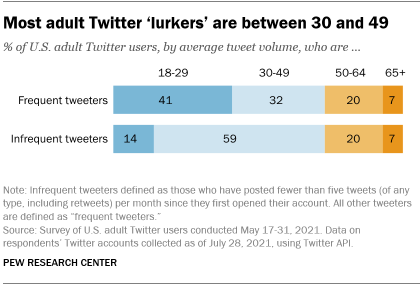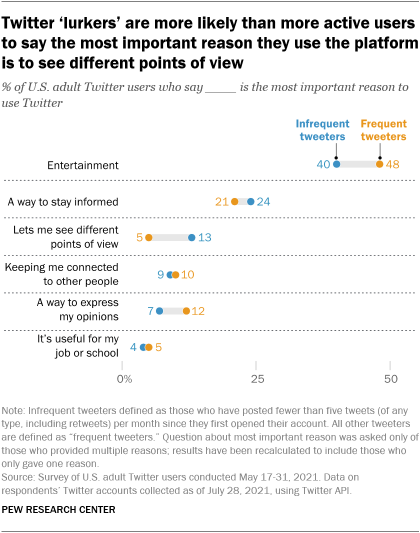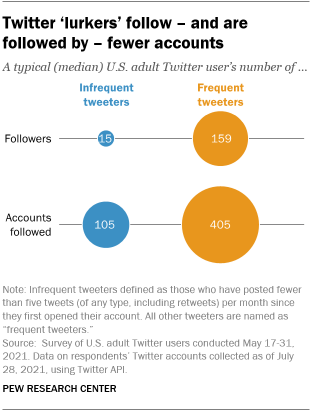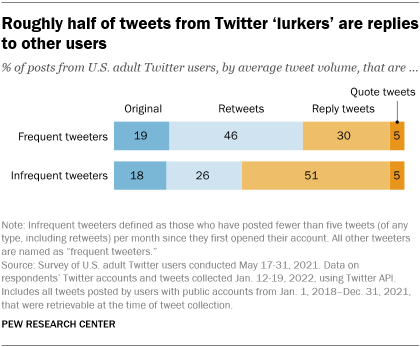A minority of highly active users produce the vast majority of tweets from U.S. adults, according to a recent Pew Research Center study. But what about adult Twitter users who tweet relatively infrequently? Who are they, and how do they use the site?
Here are five facts about so-called Twitter “lurkers,” based on the Center’s recent study. In this analysis, the terms “lurkers” and “infrequent tweeters” are used interchangeably to refer to U.S. adults who have posted an average of fewer than five tweets per month since they first opened their account, whether those tweets were original messages, retweets, quote tweets or replies. To refer to U.S. adult Twitter users who are not “lurkers,” we use the terms “active tweeters” or “frequent tweeters” interchangeably.
Pew Research Center conducted this study to gain insight into Twitter users’ views, attitudes and behaviors on the site, and how those opinions might vary based on their tweeting activity. For this analysis, we surveyed 2,548 U.S. adult Twitter users in May 2021. Everyone who took part in this survey is a member of the Center’s American Trends Panel (ATP) – an online survey panel that is recruited through national, random sampling of residential addresses – and indicated that they use Twitter. This analysis is based on the survey responses and Twitter behaviors of 1,026 respondents who volunteered a Twitter handle (their unique user name preceded by an “@” sign) for research purposes and whose handle was valid and active at the time of the study. The analysis of the types of tweets these users post is based on the subset of 917 users with public Twitter accounts.
Here are the questions used for this report, along with responses, and its methodology.
Roughly half of U.S. adults who use Twitter (49%) post fewer than five tweets per month. Demographically, this group is largely defined by its age. Around six-in-ten infrequent tweeters are ages 30 to 49 – nearly double the share among more active tweeters. By contrast, adults under 30 account for just 14% of lurkers but make up 41% of more active users.
Lurkers are not significantly different from more active tweeters when it comes to factors such as gender, party affiliation, educational attainment or race.
Lurkers report visiting Twitter’s site less frequently than more active tweeters. Around one-in-five lurkers (21%) say they visit the site every day, compared with 55% of more active tweeters. Another 38% of infrequent tweeters say they visit weekly, if not daily. The remaining 41% say they visit only a few times a month or less often.
Twitter lurkers are more likely to use the platform to hear other points of view than more frequent tweeters. When asked whether they use the site to express their own opinions or to see what others are saying, 76% of lurkers say they use the platform primarily to see what others are saying. Only 6% use the platform primarily to express their own opinions.
When asked a separate question listing a number of specific reasons why they might use the site, the largest share of both infrequent and more active tweeters say entertainment is the most important reason. But lurkers are more likely than more frequent users to say they visit the platform because it lets them see different points of view: 13% say this is their main reason for visiting the site, compared with just 5% of more active tweeters.
Lurkers follow – and are followed by – fewer accounts than more frequent tweeters. The typical (median) lurker is followed by just 15 other accounts, compared with 159 accounts for more active tweeters. Similarly, a typical lurker follows 105 accounts, while more active tweeters follow 405 accounts.
Replies make up the largest share of lurkers’ tweets. Replies to other users are the most common type of tweet by infrequent tweeters. They account for roughly half (51%) of lurkers’ tweets, compared with 30% of those from more frequent tweeters.
By contrast, retweets of other posts make up a smaller share of all posts from lurkers than from more active tweeters (26% vs. 46%). Both groups post comparable shares of original posts and quote tweets.
Note: Here are the questions used for this report, along with responses, and its methodology.







